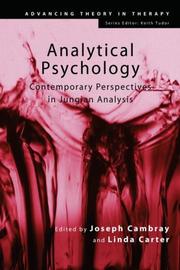| Listing 1 - 3 of 3 |
Sort by
|

ISBN: 1135443467 1583919988 1135443475 1280053208 0203492048 9780203492048 9781583919989 9781583919996 1583919996 1583919996 9786610053209 6610053200 9781135443467 9781135443474 9781280053207 9781135443429 Year: 2004 Publisher: Hove, East Sussex ; New York : Brunner-Routledge,
Abstract | Keywords | Export | Availability | Bookmark
 Loading...
Loading...Choose an application
- Reference Manager
- EndNote
- RefWorks (Direct export to RefWorks)
The Jungian approach to analysis and psychotherapy has been undergoing an extensive reconsideration during the past decade. Analytical Psychology calls special attention to the areas that have been most impacted: the core concepts and practices of the Jungian tradition, along with relevant intellectual and historical background. Internationally renowned authors drawing on the forefront of advance in neuroscience, evolution, psychoanalysis, and philosophical and historical studies, provide an overview of the most important aspects of these developments. Beginning with a chronicle of the history of the Jungian movement, areas covered include: * a background to the notion of 'archetype' * human development from a Jungian perspective * the creative extension of Jung's theory of psychological types * re-evaluation of traditional Jungian methods of treatment in the light of contemporary scientific findings * Jungian development of transference and countertransference * a new formulation of synchronicity. Analytical Psychology presents a unique opportunity to witness a school of psychotherapy going through a renaissance. Drawing on original insights from its founder, C.G. Jung, this book helps focus and shape the current state of analytical psychology and point to areas for future exploration.
Jungian psychology. --- Analytic psychology --- Analytical psychology --- Jungian psychoanalysis --- Jungian theory --- Psychoanalysis --- Jung, C. G.
Book
ISBN: 9780857939579 0857939572 Year: 2013 Publisher: Cheltenham : Edward Elgar,
Abstract | Keywords | Export | Availability | Bookmark
 Loading...
Loading...Choose an application
- Reference Manager
- EndNote
- RefWorks (Direct export to RefWorks)
Criminal procedure (International law) --- Law --- European influences. --- American influences. --- Criminal procedure (International law). --- Common law. --- Law. --- European influences --- American influences --- International Criminal Court. --- Cour pénale internationale --- Procédure pénale (droit international) --- Tribunaux criminels internationaux
Book
ISBN: 9781784719814 Year: 2016 Publisher: Cheltenham : Elgar,
Abstract | Keywords | Export | Availability | Bookmark
 Loading...
Loading...Choose an application
- Reference Manager
- EndNote
- RefWorks (Direct export to RefWorks)
This book analyzes the interactions of international criminal tribunals established since the 1990s with international, national and regional bodies, making recommendations for the International Criminal Court (ICC) as it goes forward. Placing the core issues within the statutory framework of the Rome Statute and major policy considerations, the authors examine ways in which the ICC can best coordinate with other accountability mechanisms on national and regional prosecutions, the UN Security Council, cooperation on the enforcement of arrest warrants, national non-judicial processes and amicus briefs from non-governmental organizations (NGOs). This timely evaluation of the experiences of ad hoc international criminal tribunals spotlights the legal, political and coordination issues that will likely impact the ICC's current mandate to adjudicate core international crimes. It explores how governments, inter-governmental bodies and global civil society might best collaborate to strengthen national capacity to investigate and prosecute atrocity crimes in pursuit of global justice. The book also considers the challenge of state cooperation with international criminal tribunals, identifying lessons for the ICC, while emphasizing the need for positive complementarity between the emerging African Criminal Court and the ICC. Lawyers, judges, NGOs, government officials, academics and policymakers at all levels will value this book as an important resource on transitional justice and the place of justice in the aftermath of conflict and mass atrocity
| Listing 1 - 3 of 3 |
Sort by
|

 Search
Search Feedback
Feedback About UniCat
About UniCat  Help
Help News
News